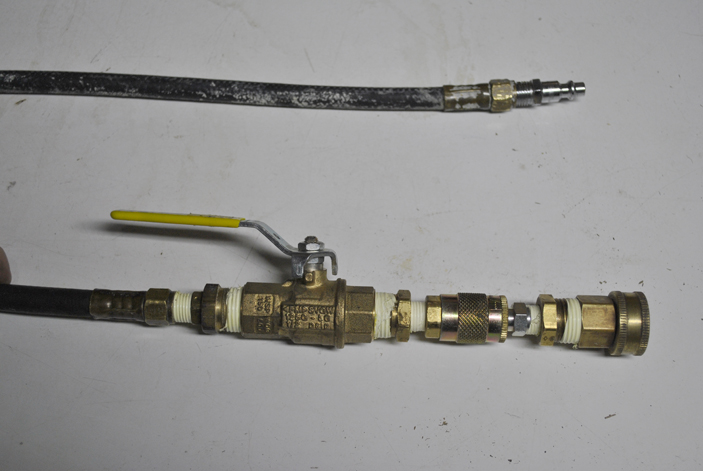| Author |
 Share Topic Share Topic  Topic Search Topic Search  Topic Options Topic Options
|
Raymondo 
Newbie


Joined: 10 Apr 2012
Location: Vancouver, BC
Online Status: Offline
Posts: 9
|
 Calendar Event: Winterizing without anti-freeze Calendar Event: Winterizing without anti-freeze
Posted: 28 Dec 2012 at 12:05pm |
Here's a little trick for voiding all the potable water out of the lines in preparation for winter without the use of anti-freeze. Air. I built a device made using standard air tool fittings and a small compressor to blow out the lines (slowly) without the fear of over pressurizing and blowing out a tap or seal. I first removed the threaded drain plug from the HWT and let drain out by gravity. Next open all water taps to vent. Attach blow-out device to R-Pod city pressure connection outside, with shutoff valve closed. Connect air line to compressor, set pressure to about 20 lbs, and turn it on. Slowly turn ball valve (yellow handle) until air flows into the water connection forcing water through the interior lines, and out through the HWT drain. Note: this does not drain your fresh water tank. You will have to pump that dry into your grey water tank, and then drain. 
|
|
2011 RP-171 Hood River Edition
Towed by Dodge Dakota Sport
|
 |
tsunami123 
Newbie


Joined: 07 Dec 2012
Location: MINNESOTA
Online Status: Offline
Posts: 21
|
 Posted: 28 Dec 2012 at 11:35pm Posted: 28 Dec 2012 at 11:35pm |
 Camping World has a similar air hose fitting (without the valve) (#38534) for $9. Your air hose does have to have quick connect fitting on it. I bought one...very convenient...I set my air compressor to 30psi...and the lines are cleared in just a couple of minutes.
|
 |
this_is_nascar 
Senior Member


Joined: 24 Jan 2010
Location: NJ
Online Status: Offline
Posts: 466
|
 Posted: 29 Dec 2012 at 8:37am Posted: 29 Dec 2012 at 8:37am |
Originally posted by Raymondo
Here's a little trick for voiding all the potable water out of the lines in preparation for winter without the use of anti-freeze. Air. I built a device made using standard air tool fittings and a small compressor to blow out the lines (slowly) without the fear of over pressurizing and blowing out a tap or seal. I first removed the threaded drain plug from the HWT and let drain out by gravity. Next open all water taps to vent. Attach blow-out device to R-Pod city pressure connection outside, with shutoff valve closed. Connect air line to compressor, set pressure to about 20 lbs, and turn it on. Slowly turn ball valve (yellow handle) until air flows into the water connection forcing water through the interior lines, and out through the HWT drain. Note: this does not drain your fresh water tank. You will have to pump that dry into your grey water tank, and then drain.

|
... or better yet, just unscrew the drain valve from the underside of your fresh water tank and let it drain onto the ground.
|
|
"Ray & Connie"
- 2017 R-Pod RP-180
- 2007 Toyota Tacoma TRD-Off Road
|
 |
Raymondo 
Newbie


Joined: 10 Apr 2012
Location: Vancouver, BC
Online Status: Offline
Posts: 9
|
 Posted: 01 Jan 2013 at 10:09pm Posted: 01 Jan 2013 at 10:09pm |
|
Yes T_I_Nascar. I hadn't thought of that! That would get some of the sediment out as well, if present.
|
|
2011 RP-171 Hood River Edition
Towed by Dodge Dakota Sport
|
 |
Pod People 
Senior Member

Joined: 22 Sep 2011
Location: Chapel Hill,NC
Online Status: Offline
Posts: 1088
|
 Posted: 03 Jan 2013 at 6:07pm Posted: 03 Jan 2013 at 6:07pm |
|
We do a similar type of winterizing using air to remove the water in the lines. We use a small hand operated bicycle pump to remove all water from the lines. We first open all faucets and drain everything as much as possible. We drain the water heater manually by removing the anode
rod. Turn on the pump briefly to ensure there is no water left there.We bought a small plastic fitting that screws into the city water inlet.and has a nipple on the other end. It allows you to hook up a small hand pump. We then use the hand pump to empty all of the remaining water in the lines. Seems to be easy and simple.
Vann Evans
|
 |
this_is_nascar 
Senior Member


Joined: 24 Jan 2010
Location: NJ
Online Status: Offline
Posts: 466
|
 Posted: 04 Jan 2013 at 8:41am Posted: 04 Jan 2013 at 8:41am |
Originally posted by Pod People
We do a similar type of winterizing using air to remove the water in the lines. We use a small hand operated bicycle pump to remove all water from the lines. We first open all faucets and drain everything as much as possible. We drain the water heater manually by removing the anode rod. Turn on the pump briefly to ensure there is no water left there.We bought a small plastic fitting that screws into the city water inlet.and has a nipple on the other end. It allows you to hook up a small hand pump. We then use the hand pump to empty all of the remaining water in the lines. Seems to be easy and simple.
Vann Evans
|
I'll continue to harp on this method everytime I see it mentioned. In your case, I'm even more concerned. "Draining everything as much as possible" is not good enough. I can guarantee you that, with using only a hand pump, you did not evacuate all the water from the system. You are risking major damage and expense. I continue to scratch my head trying to figure out the reluctance in using antifreeze to winterize. It's inexpensive and guarantees you'll be good for the winter. Someone once mentioned that they can still "taste" it after they sanitized, but I think that's a subconscious thing or they don't sanitize properly.
Anyway, good luck to you.
|
|
"Ray & Connie"
- 2017 R-Pod RP-180
- 2007 Toyota Tacoma TRD-Off Road
|
 |
Keith-N-Dar 
podders Helping podders - pHp


Joined: 03 Apr 2011
Location: Mayville, WI
Online Status: Offline
Posts: 1447
|
 Posted: 04 Jan 2013 at 9:16am Posted: 04 Jan 2013 at 9:16am |
|
A family member drains everything and removes the pump and takes it in the house rather than using anti-freeze. To each their own.
|
|
Keith-N-Dar
Boris & Betty (Boston Terriers)
2011 R-Pod 177
2010 Ford F-150
|
 |
techntrek 
Admin Group - pHp


Joined: 29 Jul 2009
Location: MD
Online Status: Offline
Posts: 9062
|
 Posted: 04 Jan 2013 at 9:29pm Posted: 04 Jan 2013 at 9:29pm |
|
I continue to back Nascar on this. One of the biggest problem areas are the valve seats, so just taking the pump out only protects the pump from damage. You would have to remove all of the valves (all faucets and the entire toilet) to protect them.
|
|
|
 |
Keith-N-Dar 
podders Helping podders - pHp


Joined: 03 Apr 2011
Location: Mayville, WI
Online Status: Offline
Posts: 1447
|
 Posted: 04 Jan 2013 at 10:31pm Posted: 04 Jan 2013 at 10:31pm |
|
I use antifreeze and don't worry about freezing stuff.
|
|
Keith-N-Dar
Boris & Betty (Boston Terriers)
2011 R-Pod 177
2010 Ford F-150
|
 |
tsunami123 
Newbie


Joined: 07 Dec 2012
Location: MINNESOTA
Online Status: Offline
Posts: 21
|
 Posted: 04 Jan 2013 at 10:35pm Posted: 04 Jan 2013 at 10:35pm |
|
The first fall I had my Pod, I planned on using an air compressor to blow out my water lines, followed by pumping RV antifreeze through them. After I blew out the lines...I had a family emergency, so I wasn't able to get back for a couple days to add the antifreeze. When I did...the air compressor was still hooked up to the Pod. For some reason...I ran the compressor again (even tho' I had blown out what I thought was all of the water...no liquid spraying out). To my surprise several good blasts of water jetted out of the faucets. I think that there was a sufficient coating of water on the inside of the pipes so that after a day or two liquid had accumulated at one or more low spots. I don't know if this small volume of water would have been enough to crack a valve or not. But from then on...I always add antifreeze after blowing out the pipes.
I really don't like the taste left in the pipes in the Spring so I blow out the antifreeze, followed by flushing with clean water and then I make up a couple of gallons of baking soda water and pump it into the pipes and then let it sit for a day or two. Then I flush the soda water...and the bad taste is gone.
|
 |




